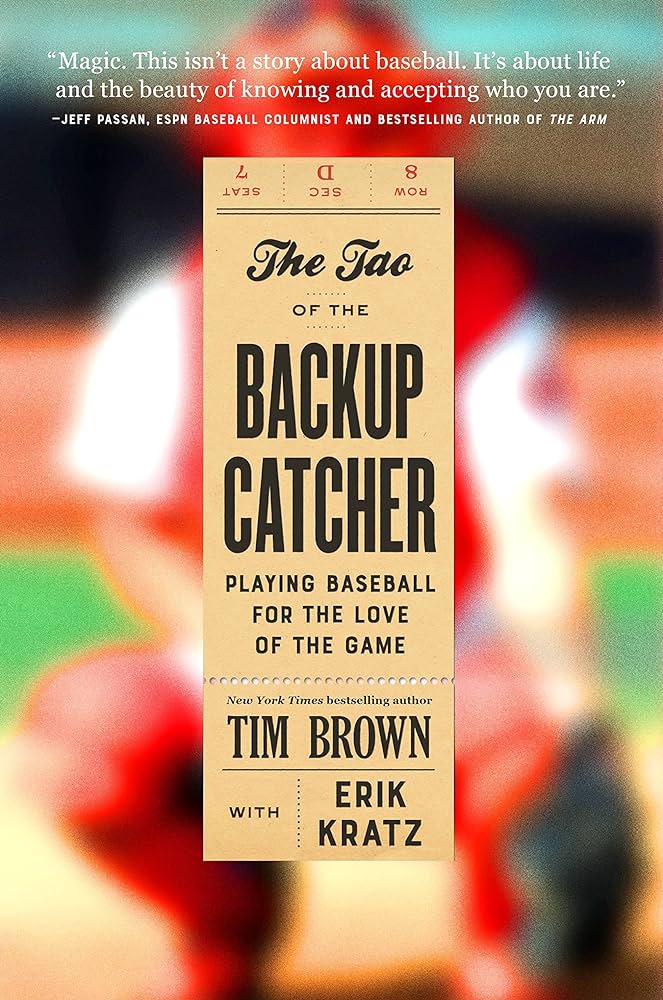As pitchers and catchers report for spring training, I am reminded of my career as a third-string catcher and the lessons learned along the way.
The call came on a Spring Saturday afternoon when I was 13 years old. I had tried out for my first travel baseball team and the coach of the Harford Sox was calling to tell me the good news. “You made the team. We are going to carry three catchers and you are the third.”
“Thank you, coach”, I said before hanging up the receiver and storming out of the house, grabbing a basketball, and shooting hoops out of spite.
My father followed me out the door, confused. “You made the team, right?”
“Yes, but I am not just a backup, I am the third-string catcher. What good is it to be on the team?” I was mad. My mind was snatching defeat out of the jaws of victory. I needed perspective.
The conversation that followed around the backyard basketball hoop sparked a transition in my identity as an athlete and teammate.
I remember my father explaining to me that just being around better players and exposed to high-consequence situations would help me to grow as a ballplayer and as a leader. Maybe I’m not the star, but maybe I can still be useful. His point was this: This opportunity is bigger than you; Maybe it’s time to reimagine your role.
While it is true the game forgives a difficult personality when it comes with a 98-mph fastball, it’s also true that there’s no bad time to grow up and be part of something greater than oneself.
Tim Brown and Erik Kratz, The Tao of the Backup Catcher
The Role of a Backup Catcher
There are 25 players on a Major League Baseball roster. The backup catcher is #25 more often than not. He plays on Sundays when a day game follows a night game. He catches the second half of a doubleheader. He bats .200-something and never pinch runs. But none of that really defines the job. Because behind the scenes, he is focused on the process of making a team better.
As Tim Brown and Erik Kratz write in the book The Tao of the Backup Catcher, “The backup catchers primarily practice a team sport. Theirs is a constant commitment to a routine that prepares them for a day or two a week the rest of the time is an ego test.”

Backup catchers are valuable cogs on winning baseball teams but becoming one means having the self-awareness to go through a transition; to see oneself differently. Erik Kratz was a career backup catcher and in his book, he captured his 18 years of experience. It is more than a baseball book. It is a book about self-awareness, ego, and the life transitions that every one of us will experience.
Kratz came from a small town, not far from me, in Pennsylvania and went to a tiny college that had never produced a major league player. But he was drafted and gained a toehold as a ballplayer. Baseball is unique among professional sports. The system of minor leagues, from Rookie League to AAA, is a gauntlet for players to run. Kratz learned this through 10 years of working his way up on buses, in small towns, for many teams, all in the hope of reaching the Big Leagues, The Show.
In 2010, he felt like he was on the cusp. He made the AAA All-Star Game, held close to home in Allentown, Pennsylvania, and invited family and friends to come to witness the experience. Kratz started the game, played three innings, and then was told he was being taken out. As if he was told he was the third-string catcher, he protested to his coach who responded, “Do you want to play in this game or do you want to go to The Show?”
That was how he found out that his dream of being a Major League ballplayer was coming true. A camera crew approached him for an in-game interview. Through tears of joy, he processed this last, greatest promotion on live television.
As I read this my jaw dropped, realizing that I had been at that very game in Coca-Cola Park, home of the Lehigh Valley Iron Pigs. A game that had little consequence except for this man and his family for whom it validated a career.
For Erik Kratz, it was the start of his career as a major league catcher. It was also a time of transition because he would no longer play the role of a starter. He was a backup.
Becoming the Leader
There is a reason why many of the winningest managers in baseball history have been former backup catchers. It’s because they learn to pay attention, to be ready at all times, to see the big picture, and not just their next at bat. They are also humble enough to embrace the transition from the role of star to the role of great teammate.
There is a powerful story in The Tao of the Backup Catcher about David Ross, a catcher for the Boston Red Sox in 2008. He had been a starter for the Cincinnati Reds early in that season before being traded to the Red Sox. He found himself a backup for the first time in his career and that resulted in an identity crisis. Who am I now as a player if I am not the starter? Then came a fateful conversation with his GM on the last day of the season.
As the team sat in the clubhouse, dejected after barely missing the World Series, Theo Epstein walked the room offering consolation to the players. But to David Ross, he offered words that would change his career:
“We ended up having an honest talk about what had been said about him coming out of Cincinnati, and a reputation he was getting and how valuable I thought he could be to a team if he were to reinvent himself and let go of the things he can’t control and just focus on the team.”
In other words, you are not the star, and that is not who this team needs you to be. You are the one focused on preparation, morale, and details. You are a leader. Embrace the humility of that role and you will be integral to a winning team. You will be…useful.
For Ross, this was the moment when he no longer fought against who he was. He didn’t try to deny where his true talents were. In the next 10 years he would become several things that he had never been before:
- A backup catcher
- A two-time World Series champion
- One of the most respected clubhouse players in the league
- A major league manager
Learning to be useful
The lessons are rich for all of us who face transition in life. If we allow our ego to reign, we might fight to hold onto the person we were at the expense of the person we could become. I see this often in retirement planning. I am the business owner, the executive, the star salesperson. If I no longer have that title, then who am I? Maybe something even greater, but that will require a new sense of self-awareness.
The late Investing sage Charlie Munger was once asked what he would want written on his epitaph. He responded: “I tried to be useful.”
Being useful in an endeavor larger than ourselves is unselfish and humble. But it might be the worthy goal of any life transition. How can the best version of myself today be useful to those around me?
If we sense that a life transition is approaching, or that this moment expects something different from us than has been expected before, here is what we can learn from the journey of a backup catcher:
- Be open to what a new season of life means for our identity
- Listen to the trusted people in your life who can provide insights on your most valuable attributes
- Seek to define success as something greater than ourselves: As a couple, as a family, as a team.
The most we can do is show up, play on, believe in something, celebrate the good stuff, laugh at the dumb stuff, have a good cry, block a ball in the dirt for a friend every once in a while, and then be the sort of person others can rely on. Baseball isn’t life. But it’s not a bad place to practice life.
Tim Brown and Erik Kratz

Aggressive Balance is a biweekly e-newsletter authored by Dennis Morton, Co-Founder and Principal of Morton Brown Family Wealth.
A gifted storyteller and financial advisor by trade, Dennis explores topics of leadership, finance, and the human condition in his writing as they relate to curating a life worth living.
Get additional exclusive content delivered straight to your inbox by subscribing today.
